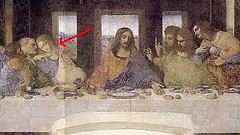By CARDINAL GEORGE PELL
"LEARN the Truth" proclaimed the huge, expensive advertisements near the Anzac Bridge.
One of the many things that can be said with certainty about The Da Vinci Code movie is that you will find precious little truth there.
The film is boring. Knowledge of the storyline from the book was fatal to this slow-moving film. I admit that I was not predisposed to like it, but the film critics were right for once. This film is implausible and dull.
In the novel a "fact" page claimed "all descriptions of artwork, architecture, documents and secret rituals in this novel are accurate", while Brown claimed too that the Priory of Sion had existed for 950 years. In fact it was invented in 1956 by a convicted conman. The film is more careful and makes no such claims to "facts".
Dan Brown doesn't seem to like Christians, particularly Catholics, and while he may not have intended to be malicious, I quickly concluded it was motivated by an ambition for easy money.
I suspect he could not believe his luck as he tapped so successfully into an enormous market.
The film does not make any sort of claim to historical accuracy and is bizarre fiction.

1 comment:
Every viewer would realise that most of it is nonsense, although some, perhaps many, would not be sure which five or 10 per cent might be true. A more intelligent and determined opponent of Christianity would have to be much more plausible than Brown.
The film had a big wave of early viewers, but numbers in succeeding weeks dropped quickly as news of the film's quality spread by word of mouth.
We all know there is a huge market for salacious gossip about celebrities and Christ and Mary Magdalene can be recast into ancient celebrities. Also a number of people today would be relieved to find there was a fraud at the heart of Christianity, the source of so many requirements and restraints, but they would have been disappointed by the Da Vinci Code.
In the film's defence, we should recognise that it never set out to convince, but to entertain and make money.
One American survey showed that the religious views of only five per cent of viewers were changed by the film, and in a perverse way, it probably provoked more people to search for the truth than damage to those with little or no faith.
The Christian churches too were geared up to respond to the public's curiosity, and the Australian Catholic Students Association website was visited by 30,000 people in three weeks. Not surprisingly, the official website of Opus Dei, the Catholic group which masterminded the multiple murders in the story, also received a large increase in requests for information, almost none of them hostile.
It is an ill wind that blows no one any good.
Post a Comment